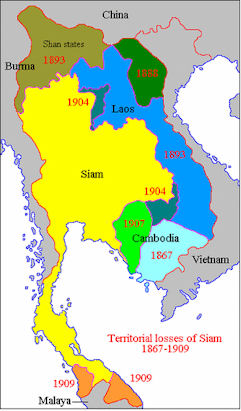

Zitierweise / cite as:
Payer, Alois <1944 - >: Chronik Thailands = กาลานุกรมสยามประเทศไทย. -- Chronik 2001 / B. E. 2544. -- 2. Januar bis Juni. -- Fassung vom 2017-03-20. -- URL: http://www.payer.de/thailandchronik/chronik2001b.htm
Erstmals publiziert: 2012-10-28
Überarbeitungen: 2017-03-20 [Ergänzungen]; 2016-11-09 [Ergänzungen]; 2016-08-15 [Ergänzungen]; 2016-04-18 [Ergänzungen]; 2016-03-01 [Ergänzungen]; 2016-02-09 [Ergänzungen]; 2015-10-02 [Ergänzungen]; 2014-11-21 [Ergänzungen]; 2014-10-19 [Ergänzungen]; 2014-09-23 [Ergänzungen]; 2014-08-25 [Ergänzungen]; 2014-04-11 [Ergänzungen]; 2014-02-15 [Ergänzungen]; 2013-06-11 [Ergänzungen]; 2013-05-24 [Ergänzungen]; 2013-04-25 [Teilung des Jahrgangs]; 2013-04-21 [Ergänzungen]; 2013-04-17 [Ergänzungen]; 2013-04-08 [Ergänzungen]; 2013-03-28 [Ergänzungen]; 2013-03-19 [Ergänzungen]; 2013-03-09 [Ergänzungen]; 2013-03-02 [Ergänzungen]; 2013-01-13 [Ergänzungen]; 2012-11-12 [Ergänzungen]
©opyright: Dieser Text steht der Allgemeinheit zur Verfügung. Eine Verwertung in Publikationen, die über übliche Zitate hinausgeht, bedarf der ausdrücklichen Genehmigung des Herausgebers.
Dieser Text ist Teil der Abteilung
Thailand von
Tüpfli's Global Village Library
ช้างตายทั้งตัวเอาใบบัวปิดไม่มิด
|
Gewidmet meiner lieben Frau Margarete Payer die seit unserem ersten Besuch in Thailand 1974 mit mir die Liebe zu den und die Sorge um die Bewohner Thailands teilt. |
|
Bei thailändischen Statistiken muss man mit allen Fehlerquellen rechnen, die in folgendem Werk beschrieben sind:
Die Statistikdiagramme geben also meistens eher qualitative als korrekte quantitative Beziehungen wieder.
|
2001-01-06

Wahlen. Überwältigender Wahlsieger ist Thaksin Shinawartra (ทักษิณ ชินวัตร) mit seiner Thai Rak Thai Party (พรรคไทยรักไทย). Thaksins Versprechen: "Bevor ich sterbe, will ich zuerst die Feinde töten, und diese sind. Armut, Drogen und Korruption." Dies führt zu Thaksins Social Order Campaign (ชาติระเบียบสังคม).
Abb.: Sitzverteilung nach den Wahlen 2001
"General elections were held in Thailand on January 6, 2001. 500 seats in the House of Representatives (Sapha Poothaen Rassadorn) were at stake. In accordance with the now abrogated 1997 constitution of Thailand, the House of Representatives was composed of 400 members elected from single-member constituencies and 100 members elected from national party lists on a proportional basis. Results
Voting figures show the votes cast for the national list members.
Party Votes Seats List Const Total Thai Rak Thai (พรรคไทยรักไทย) 11,634,495 40.6 48 200 248 Democrat Party (พรรคประชาธิปัตย์) 7,610,789 26.6 31 97 128 New Aspiration Party (พรรคความหวังใหม่) 2,008,945 07.0 8 28 36 National Development Party (พรรคชาติพัฒนา) 1,755,476 06.1 7 22 29 Thai Nation Party (พรรคชาติไทย) 1,523,807 05.3 6 35 41 Others 4,095,690 14.3 - 18 18 Total 28,629,202 100 400 500 [Quelle: http://en.wikipedia.org/wiki/Thai_general_election,_2001. -- Zugriff am 2011-11-04]
2001-01-06
In den Provinzen Yala (ยะลา) und Narathiwat (นราธิวาส) überfallen bewaffnete Banden Dörfer und erbeuten Waffen des Volunteer Defence Corps (Or Sor) (อส. = กองอาสารักษาดินแดน).
Abb.: Lage der Provinzen Yala (ยะลา) und Narathiwat (นราธิวาส)
[Bildquelle: CIA. -- Public domain]
2001-01-09
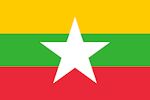
Thai-Behörden beschlagnahmen auf dem Andamanen-Meer (ทะเลอันดามัน / မုတ္တမ) auf einem thailändischen Fischerei-Schiff 7,8 Mio. Pillen Ya Ba [ยาบ้า] und 116 kg Heroin. Das Heroin wurde zuerst auf dem Irrawady (ဧရာဝတီမြစ်) befördert, dann auf birmanischen Fischerbooten im Andamanenmeer über den Ko Surin Archipel (หมู่เกาะสุรินทร์) bis südlich von Ranong (ระนอง).
Abb.: Lage des Ko Surin Archipels (หมู่เกาะสุรินทร์) und von Ranong (ระนอง)
[Bildquelle: OpenStreetMap. -- Creative Commons Lizenz (Namensnennung, share alike)]
2001-01-10
Gründung der Rainbow Sky Association of Thailand (สมาคมฟ้าสีรุ้งแห่งประเทศไทย). "A registered community organization working with people with sexual diversity in Thailand." Die Association gibt den Newsletter สายฝนต้น รุ้ง ("Regen vom Regenbogen") heraus.
Abb.: ®Logo
Abb.: Titelblatt der Männerausgabe von สายฝนต้นรุ้ง Nr. 12 (2008)
Abb.: Titelblatt der Lady version von สายฝนต้นรุ้ง Nr 12 (2008) (im Original farbig)
2001-01-11
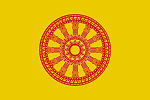
Abb.: Sanitsuda Ekachai (สนิทสุดา เอกชัย)
[Bildquelle: FAO]Bangkok Post: Sanitsuda Ekachai (สนิทสุดา เอกชัย, 1955 - ): "We lose when all we do is take"
Kommentar zum Verkauf von 924 Rai Tempelland (in Rangsit - รังสิต, Provinz Pathum Thani - ปทุมธานี) durch Wat Thammikaram (วัดธรรมมิการาม), Provinz Prachuap Khiri Khan (ประจวบคีรีขันธ์), an den Alpine Golfklub. Obwohl die reiche Stifterin des Landes - Nuem Chamnanchartsakda - ausdrücklich bestimmt hatte, dass die Bauern, die das Land gepachtet hatten, auf dem Land bleiben dürfen, wurden die Bauern durch den Verkauf vom Land vertrieben.
"That the Wat Thammikaram monks see money as more important than the poor also reflects the current state of the Sangha. Rich from its land deal, the temple keeps adding new plush buildings, leaving the old temple hall built by Neum’s family neglected and forlorn — like her legacy to the temple. When we see it as normal for the rich few to control most of the land and for monks to get richer while the poor get poorer, that is the real crisis affecting our land." [Sanitsuda Ekachai (สนิทสุดา เอกชัย) <1955 - >: Keeping the faith : Thai Buddhism at the crossroads. -- Bangkok : Post Books, 2001. -- 322 S. : Ill. ; 23 cm. -- ISBN 974-228-016-9. -- S. 310]
Abb.: Lage von Prachuap Khiri Khan (ประจวบคีรีขันธ์)
[Bildquelle: OpenStreetMap. -- Creative Commons Lizenz (Namensnennung, share alike)]
Abb.: Lage von Rangsit (รังสิต)
[Bildquelle: OpenStreetMap. -- Creative Commons Lizenz (Namensnennung, share alike)]
Abb.: Alpine Golf Club, Bangkok, 2001
[Bildquelle: toyohara. -- http://www.flickr.com/photos/toyohara/2082112/. -- Zugriff am 2012-09-28. -- Creative Commons Lizenz (Namensnennung, keine kommerzielle Nutzung)]
2001-01-12
Totale Mondfinsternis. Während dieser wurde dunkel-oranger Mond nahe beim Wat Arun (วัดอรุณ) gesehen. Dies gilt als glückverheißend.
Abb.: Wat Arun (วัดอรุณ), 2009
[Bildquelle: Ludovic Hirlimann. -- http://www.flickr.com/photos/lhirlimann/3870062350/. -- Zugriff am 2012-04-25. -- Creative Commons Lizenz (Namensnennung, keine kommerzielle Nutzung)]
2001-01-15
Start von Wikipedia.
Abb.: ®Logo
2001-01-16

Die 13/15-jährigen Zwillinge Johnny und Luther Htoo und die Reste ihrer God's Army Faction of Christian Karens ergeben sich im Dschungel bei Ratchaburi (ราชบุรี) thailändischen Sicherheitskräften. (Sie zum 2000-01-24).
Abb.: Lage von Ratchaburi (ราชบุรี)
[Bildquelle: OpenStreetMap. -- Creative Commons Lizenz (Namensnennung, share alike)]
2001-01-20
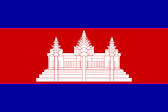
Zwanzig Jahre nach dem Ende des Mörderregimes der Roten Khmer (ខ្មែរក្រហម) billigt die Nationalversammlung Kambodschas einstimmig die Bildung eines internationalen Tribunals (Chambres Extraordinaires au sein des tribunaux cambodgiens - សាលាក្ដីខ្មែរក្រហម) zur Untersuchung der Verbrechen und Bestrafung der Verbrecher.
2001-01-20 - 2010-06-30

Nachdem der philippinische Präsident Joseph Estrada wegen Korruption abgesetzt worden ist, wird seine Stellvertreterin, Gloria Macapagal-Arroyo (1947 - ) Präsidentin der Philippinen.
Abb.: Gloria Macapagal-Arroyo (1947 - ), 2006
[Bildquelle: U.S. Navy photo by Journalist 2nd Class Brian P. Biller / Wikipedia. -- Public domain]
2001-01-20 - 2009-01-20

George W. Bush (1946 - ) ist Präsident der USA. Richard Bruce "Dick" Cheney (1941 - ) ist Vizepräsident.
Abb.: George W. Bush, 2005
[Bildquelle: Webb, Murray, 1947- :George W. Bush [ca 23 January 2005]. Ref: DX-001-988. Alexander Turnbull Library, Wellington, New Zealand. http://natlib.govt.nz/records/23173662. -- You can copy this item for personal use, share it, and post it on a blog or website. It cannot be used commercially without permission.]
Abb.: Vizepräsident Richard Bruce "Dick" Cheney, Sicherheitsberaterin Condoleeza Rice (1954 - ) und Präsident George W. Bush
[Bildquelle: DonkeyHotey. -- http://www.flickr.com/photos/47422005@N04/7979975551. -- Zugriff am 2014-02-15. -- Creative Commons Lizenz (Namensnennung, share alike)]
2001-01-20 - 2005-01-26

Colin Powell (1937 - ) ist US Secretary of State (Außenminister).
Abb.: Colin Powell
[Bildquelle: John Clifton / US Army / Wikipedia. -- Public domain]
2001-01-30
Der Umweltaktivist Jurin Ratchapol (จุรินทร์ ราชพล, 1952 - 2001) wird bei Pa Khlok [ป่าคลอก] ermordet.
Abb.: Lage von Pa Khlok [ป่าคลอก]
[Bildquelle: OpenStreetMap. -- Creative Commons Lizenz (Namensnennung, share alike)]
"Jurin Ratchaphon [จุรินทร์ ราชพล, 1952 - 2001] was one of at least 18 Thai activists involved with environmental and social issues who were murdered or disappeared during Thaksin Shinawatra's terms as prime minister. At least one activist has been killed since the coup deposed the former PM. Opposing schemes that make money for powerful Thais has long been a hazardous occupation in Thailand. ‘It is no exaggeration to say that prawn farming is a business of obscene greed. ’ (Let prawn farmers sink or swim. Editorial, The Nation 29/11/2003)
On January 30, 2001, four months after a Pa Khlok [ป่าคลอก] villager barely survived an attempt on his life by a hit and run pick-up truck driver, an employee of Watchara Prawn Farm shot Jurin Ratchaphon dead as he picked cashews near his home village of Ban Pa Khlok. Jurin was an activist protecting Phuket’s [ภูเก็ต] last substantial tract of mangrove forest (photo previous page), which was threatened by 19 prawn farms in the immediate vicinity.
Because Jurin’s environmental work had received recognition from HM Queen Sirikit, the National Crime Division investigated the murder rather than local police. The gunman was quickly arrested and given a life sentence, but the businessman thought to be behind the killing was arrested, released on bail and later acquitted for lack of evidence.
At the time of Jurin’s murder, a farmer could make 40-120 baht/kg depending on breed of prawn. The prawn business in Phuket alone was worth an estimated US$30m per year. In 2000 national production reached 299, 700 m tons and average annual earnings were over US$2 billion. Thailand was the world’s leading supplier.
From the point of view of prawn farmers the best land for prawn farming was near mangroves. Tidal inundation made water exchange easier, the land was virtually free (in conventional market analysis), and prawn farming received official backing as the Department of Fisheries was promoting aquaculture as a more sustainable alternative to trawling for prawn. Between 1983 and 1996 prawn farms more than doubled in area to 66, 027 hectares, and the industry grew to account for 25 percent of the value of exports.
Protection of the mangroves was left to the Forestry Department. Though estimates vary, the National Social and Economic Development Board (NESDB [สำนักงานคณะกรรมการพัฒนาการเศรษฐกิจและสังคมแห่งชาติ]) calculated that 253, 000 of a total 380, 000 hectares of mangroves were destroyed between 1961 and 1993, with the highest annual rates of destruction occurring in the 1980s and early 1990s. How much of this loss could be attributed to prawn farms is unclear, but the NESDB figure of 25 percent was considered very conservative. Naturally prawn-farmers pointed to other causes of mangrove destruction, such as charcoal manufacture, road and dyke construction to prevent seawater intrusion, land reclamation for residential and industrial purposes, mining concessions, salt farming and harbor construction.
Jurin Ratchaphon was protecting more than a sustainable lifestyle, however. Mangrove dependent species are thought to account for at least one-third of wild fish landings (worldwide), and as much as two-thirds of tropical fish species may depend on mangroves at some stage of their life cycle. A hectare (ha) of mangrove is estimated to produce an annual average of 3600 kg of captured fish with a value of US$3, 400/ha.
Even though more than 75 percent of fry are supplied by hatcheries in Thailand, trawling for wild prawn as brood stock is still necessary. Such trawling may be conducted close inshore (to mangroves from where much of the larvae may originate), disturbing species distribution in vital fish-breeding grounds. For every kilogram of prawn caught, between ten and twenty kilograms of unwanted fish species are taken by the nets — prawn trawling involves the highest ratios of target catch to by-catch. Though much of the by-catch — an estimated 1. 2 m tons of trash fish in Thailand — is used to make feed for the aquaculture industry, it takes 2kg of feed to raise 1 kg of prawn."
[Quelle: Hargreave, Oliver: Exploring Phuket & Phi Phi : from tin to tourism. -- Hong Kong : Within, 2008. -- 257 S. : Ill. ; 21 cm. -- ISBN 978-962-217-783-3. -- S. 162f. -- Fair use]
Abb.: Lage von Phuket [ภูเก็ต]
[Bildquelle: OpenStreetMap. -- Creative Commons Lizenz (Namensnennung, share alike)]
2001-02

Birmanische Regierungstruppen erobern den Stützpunkt Unit 9613 der Thahan Phran (ทหารพราน, Rangers) in Ban Pang Noon bei Mae Sai (แม่สาย), Provinz Chiang Rai (เชียงราย). Der Stützpunkt ist mit 19 Thahan Phran besetzt.
Abb.: Lage von Mae Sai (แม่สาย)
[Bildquelle: OpenStreetMap. -- Creative Commons Lizenz (Namensnennung, share alike)]
2001-02-02

Das Council of State entscheidet, dass die Maha Mongkut Ratchavithalayai Foundation unrechtmäßig "Religionsland" an Alpine Golf Course verkauft hat, welcher es an den Bauträger SC Asset weiterverkaufte. SC Asset ist mit Ministerpräsident Thaksin verbunden. Das Land in Pathum Thani war ursprünglich 1971 testamentarisch Wat Dhammakaya vermacht worden. 1990 erlaubte der Chef des Land Department dem Abt des Tempels, das Land auf die Stiftung zu übertragen. Im August bestimmt das Land Department, dass das Land nicht verkauft werden kann.
Abb.: Lage des Alpine Golf Course
[Bildquelle: OpenStreetMap. -- Creative Commons Lizenz (Namensnennung, share alike)]
2001-02

US-See-Luftschrauber Sikorsky MH-60S Knighthawk. Die Royal Thai Navy wird diesen Typ in Dienst nehmen.
Abb.: Sikorsky MH-60S Knighthawk, 2012
[Bildquelle: Por Khan / Wikimedia. -- Public domain]
2001-02-07
23 Mitarbeiter der Fernsehstation iTV (สถานีโทรทัศน์ไอทีวี) werden wegen ihrer Berichterstattung über Ministerpräsident Thaksin und seine Thai Rak Thai Partei (พรรคไทยรักไทย) entlassen. Die Familie Thaksins hat die Mehrheit der Anteile an der Shin Corporation (ชิน คอร์ปอเรชั่น), der iTV gehört.
2001-02-09 - 2006-06-19
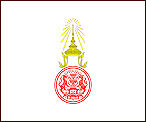
Thaksin Shinawatra (ทักษิณ ชินวัตร, 1949 - ) ist Ministerpräsident (นายกรัฐมนตรีแห่งราชอาณาจักรไทย - Prime Minister)
Abb.: ทักษิณ ชินวัตร - Thaksin Shinawatra
[Bildquelle: Wikipedia. -- Public domain]
"Thaksin Shinawatra (Thai: ทักษิณ ชินวัตร, Aussprache: [tʰáksǐn ʨʰinnáwát]) (* 26. Juli 1949 in San Kamphaeng, Provinz Chiang Mai) war Chef der von ihm gegründeten Partei Thai Rak Thai und regierte Thailand als Premierminister von Februar 2001 bis September 2006.
Karriere – Geschäftsmann und PolitikerNach Abschluss der Schule machte Thaksin eine Polizeiausbildung an der Polizeikadetten-Akademie von Thailand in Nakhon Pathom. Dann wechselte er in die USA, wo er den Masters Degree in Strafrecht (Criminal Justice) an der Eastern Kentucky University, Richmond, und 1978 den Doktorgrad an der Sam Houston State University, Huntsville (Texas), erwarb. 1987 beendete er in Thailand den Polizeidienst im Range eines Oberstleutnant (Lieutenant Colonel).
1987 gründete er die Shinawatra Computer and Communications Group Shin Corporation (früher Advanced Info Service), die bei der Einführung des Mobilfunks und der Satellitenübertragung in Thailand erfolgreich tätig war, nicht zuletzt auch auf Grund von ausgehandelten, Wettbewerb verzerrenden Sonderkonditionen, die er von der staatlichen Telefongesellschaft TOT bekam und die seiner Firma eine quasi Monopolstellung beim Mobilfunk verschafften. 1992 wurde Thaksin vom ASEAN-Institut in Jakarta (Indonesien) zum „Businessman of the Year“ gewählt.
Seine politische Karriere begann im November 1994, als er für drei Monate Außenminister wurde und ab Mitte 1995 die Palang Dharma-Partei als Parteichef anführte. Von 1995 bis 1997 war er mit Unterbrechungen Stellvertretender Ministerpräsident.
Am 14. Juli 1998 gründete er die Partei Thai Rak Thai (TRT – „Thais lieben Thais“) und ließ sich zum Parteivorsitzenden wählen. Ab 1998 war Thaksin Mitglied des Parlaments. Am 9. Februar 2001 wurde er 23. Premierminister Thailands. Im Februar 2005 wurde er nach einem erneuten Wahlsieg in seine zweite Amtsperiode eingeführt. Der Parteiname kennzeichnet den nationalistischen Kurs seiner Politik. Trotz des starken Drucks der Weltbank seit der Währungskrise 1997 auf thailändische Regierungskreise bleibt die wirtschaftliche Diskriminierung von Ausländern erhalten. So gelten für sie weiterhin die Verbote, Grundeigentum zu erwerben oder sich an thailändischen Firmen mehrheitlich zu beteiligen. Die „Nationalisierung“ von Unternehmen wurde im Gegenteil verstärkt. Beim Mittelstand und dem wohlhabenden Bürgertum machte ihn das unbeliebt, die ärmere Bevölkerung (und damit die Mehrheit) unterstützte seine populistische Politik und ermöglichte so seine Wiederwahl, bei der es in den ländlichen Gebieten zu Stimmenkäufen gekommen sein soll. Stimmenkäufe sind und waren in Thailand jedoch von fast allen Parteien nicht unüblich.
Seine Amtsführung orientierte sich nach offiziellen Angaben an den Erfahrungen, die er als Geschäftsmann gesammelt hatte. Er trat als rigoroser Verfechter von Recht und Ordnung auf. Trotzdem nutzte er seinen politischen Einfluss, um das ohnehin schon beträchtliche Vermögen seiner Familie während seiner Amtszeit zu vervierfachen. Er gilt als einer der reichsten Männer Asiens und als der reichste Thailands. Sein Regierungsstil wurde zunehmend autoritärer. Gegen die separatistischen muslimischen Südprovinzen schlug er einen harten Kurs ein, dem viele Menschen zum Opfer fielen. Dieses Vorgehen brachte ihm eine ungewöhnlich deutliche Rüge des Königs Bhumibol Adulyadej ein. Er ging auch hart gegen den Drogenhandel vor und hatte dabei die Sympathien großer Bevölkerungsteile auf seiner Seite. Aber allein im Jahr 2003 wurden fast 2.500 Menschen im Rahmen des Drogenkriegs (teilweise wahllos) und ohne Gerichtsverfahren erschossen, wobei die Trennlinie zwischen Polizei und Drogenhändlern oft nicht klar zu ziehen war. Amnesty International erhob den Vorwurf, in vielen Fällen habe es sich um außergerichtliche Exekutionen gehandelt.
Thaksin, der die Bekämpfung der Korruption schon 2001 zu einem seiner Hauptziele erklärte, war selbst zunehmend, zusammen mit seiner Familie, seiner Partei und seinem Kabinett, massiven Korruptionsvorwürfen ausgesetzt. Der Druck erhöhte sich, als Unregelmäßigkeiten bei Aufträgen für Gepäckscanner für den neuen Flughafen Bangkok-Suvarnabhumi bekannt wurden, so dass er 2005 seine zehnte Kabinettsumbildung vollziehen musste.
Thaksin verfügte über eine umfassende Medienmacht, da er mit seinen Firmen den größten Teil der Presse und Fernsehkanäle beherrschte. Während der Wahlen im Jahr 2000 kaufte er den bis dahin regierungskritischen und einzigen nicht von Armee oder Regierung abhängenden Fernsehsender ITV auf. Eine seit Juli 2003 wöchentliche politische Talkshow wurde verboten. Kritische Veröffentlichungen, wie zum Beispiel die der Bangkok Post, versuchte er mehrfach mit Klagen wegen Verleumdung bzw. mit dem Vorwurf der Majestätsbeleidigung zu verhindern. Im September 2005 ließ die thailändische Regierung mehrere kleinere Radiostationen in Bangkok schließen, weil diese angeblich den Flugverkehr störten (siehe Weblinks). Die Opposition verfügte bei den Wahlen 2005 über keine wesentliche Medienpräsenz mehr.
Thaksin schuf ein System der Abhängigkeiten. Als ehemaliger Polizeioffizier unterstützte ihn der Polizeiapparat; die Minister wurden nach seinen Wünschen ernannt, ebenso waren viele Richter ihm und seinen Freunden gewogen. So konnte er geschickt Gesetze zu seinen Gunsten ändern, um einerseits Anklagen gegen ihn wegen Verstrickungen privater Geschäfte mit politischer Macht zu entgehen und andererseits laufende Verfahren zu blockieren.
Der Fall – Krise und NeuwahlenSeit Mai 2006 wurde Thaksin mit einem Plan in Verbindung gebracht, der Thailand unter eine Ein-Parteien-Regierung stellen sollte, dem so genannten Finnland-Komplott. Hintergrund waren Differenzen zwischen Thaksin und seinem ehemaligen Gefolgsmann Sondhi Limthongkul, der in seinen Medien den angeblichen Plan verbreiten ließ und dafür von Thaksin verklagt wurde.
Der wirkliche Abstieg des Premierministers begann Anfang 2006 mit dem Verkauf seines Kommunikationskonzerns Shin Corporation an die teilstaatliche Singapurer Investitionsgesellschaft Temasek Holdings Ltd. Thaksins Familie hatte 49,6 Prozent der Aktien für 1,88 Milliarden US-Dollar nach Singapur verkauft und musste, dank entsprechender – von ihm gelenkter – Gesetzesänderungen, keine Steuern dafür entrichten. Obwohl er bei Amtsantritt seine Firma offiziell an Familienangehörige abgetreten hatte, zog er als Geschäftsmann und Politiker weiterhin die Fäden zu Gunsten des Konzerns. Seine Firma hatte beim Aufbau des Nachrichtensystems von staatlichen Vergünstigungen profitiert. Da das Geschäft in thailändischer Währung abgeschlossen wurde, musste Singapur große Mengen des thailändischen Baht kaufen, so dass sein Kurs in die Höhe getrieben wurde. Seither stiegen auch die inländischen Zinsen.
Da außerdem die Temasek mehrheitlich dem Staat Singapur gehört und eine Beteiligung ausländischer Investoren in strategischen Wirtschaftssektoren Thailands gesetzlich eingeschränkt ist, kam es zu heftigen Protesten. Seit Februar 2006 organisierte die parlamentarische und außerparlamentarische Opposition Protestveranstaltungen in Bangkok, die sich bald auch auf andere große Städte ausweiteten. Dabei tauchten sogar Plakate auf, die den Premier als neuen Hitler darstellten. Derart unter Druck geraten, verkündete Thaksin vorgezogene Neuwahlen zum 2. April 2006. Die Oppositionsparteien boykottierten diese Wahl, und Protestwähler gingen zur Wahl, um „no vote“ zu wählen, das heißt ihre Stimme bewusst keiner Partei zu geben. Die Wahlbeteiligung lag bei 60 %, wobei Thaksins Thai Rak Thai über 50 % der abgegebenen Stimmen erhielt. Die „no vote“-Stimmen machten über 30 % aus und auffallend viele Stimmzettel waren ungültig, was eigentlich strafbar ist. In einigen Bezirken der Hauptstadt und in weiten Teilen des Südens überwogen die „no vote“ und die ungültigen Stimmen über diejenigen von Thaksins TRT. In Bangkok gab es insgesamt mehr als 1,32 Millionen Stimmenthaltungen während knapp 1,17 Millionen für TRT stimmten. Bei der Wahl von 2005 konnte TRT 32 von 37 Wahlbezirken gewinnen, 2006 bekamen in jetzt 36 Wahlbezirken nur 9 TRT-Kandidaten mehr Stimmen als Enthaltungen abgegeben wurden. Das Parlament konnte nicht zusammentreten, um den Premierminister zu wählen, da einige Sitze nicht besetzt werden konnten und es somit nicht vollständig war. Dabei spielte auch eine nicht unwesentliche Rolle, dass ein TRT-Abgeordneter seinem Gewissen folgend seine Gefolgschaft verweigerte und vorübergehend Mönch wurde, womit der Partei eine entscheidende Stimme fehlte.
Nach und nach stellte sich auch heraus, wie sehr die sogenannte „unabhängige Wahlkommission“ von der Partei Thaksins beeinflusst und abhängig war, ja sogar bestochen wurde. Nach einer Audienz beim König deutete Thaksin am 4. April seinen Verzicht auf das Amt an. Er sollte aber bis zur Konstituierung des neuen Parlaments weiterhin Interimspremier bleiben, ohne existierendes Parlament. Im April 2006 mussten (hauptsächlich im Süden des Landes) Nachwahlen durchgeführt werden, die jedoch nichts an der verfahrenen Situation änderten. Die Opposition erklärte, ihre Protestveranstaltungen so lange weiter zu führen, bis Thaksin ganz aus dem Amt gegangen sei. Nach einer sehr eindringlichen Rede des Königs an die Politiker, mit einem deutlichen Appell auch an die obersten Richter, sich ihrer Unabhängigkeit bewusst zu werden, wurde die Wahl 2006 (einschließlich der Nachwahlen) am 8. Mai 2006 wegen verschiedener Verfahrensfehler vom Verfassungsgericht als verfassungswidrig und damit für nichtig erklärt. Neuwahlen wurden auf den 15. Oktober 2006 festgelegt.
Der Putsch von 2006 und die FolgenAm 19. September 2006 besetzten Einheiten von Polizei und Militär die Hauptstadt. Thaksin Shinawatra, der sich zu diesem Zeitpunkt auf der UNO-Vollversammlung in New York City aufhielt, wurde suspendiert. Panzer rückten in das Stadtzentrum vor, mehrere Fernsehsender wurden übernommen und eine provisorische Regierung ausgerufen. Der militärische Oberbefehlshaber des von vielen erhofften, unblutigen und auf keinen Widerstand stoßenden Putsches war Sonthi Boonyaratkalin. Thaksin rief daraufhin aus dem Exil den Notstand aus, womit er allerdings keinen Einfluss auf das Geschehen mehr nehmen konnte. Die Junta unter General Sonthi setzte nach einer angekündigten Frist von zwei Wochen eine provisorische Regierung ein, deren Ministerpräsident der Ex-General Surayud Chulanont war. Es wurde eine Kommission eingesetzt, um eine neue Verfassung auszuarbeiten, die in einem Volksreferendum zur Abstimmung gestellt werden sollte. Am 19. August 2007 stimmten die Thais dem Verfassungsentwurf bei einer Beteiligung von unter 60 % mit 57 % zu 40 % zu. Am 23. Dezember 2007 wurden freie Wahlen durchgeführt, aus denen die PPP, eine Nachfolgepartei von Thaksins Thai Rak Thai, unter Samak als Siegerin hervorging. Die Demokraten mit ihrem Spitzenkandidaten Abhisit wurden zweitstärkste Kraft.
Am 2. Oktober 2006 erklärte Thaksin aus seinem Londoner Exil seinen Rücktritt von der Führung der Partei Thai Rak Thai. Seitdem hielt er sich mehrfach in der Volksrepublik China, in Hongkong und in Singapur auf und versuchte anscheinend von dort aus, ein politisches Comeback zu organisieren. Die TRT spielte keine wesentliche Rolle mehr, da ihre Mitglieder die Partei in Scharen verließen. Da mehrere Strafverfahren gegen ihn eingeleitet wurden, kann Thaksin derzeit nicht nach Thailand zurückkehren, da er mit seiner sofortigen Verhaftung rechnen muss. Ende Mai 2007 verkündete das Verfassungsgericht ein Urteil, das den Wahlbetrug Thaksins und seiner Partei-Clique feststellt sowie die TRT für aufgelöst erklärt, während die oppositionelle Demokratische Partei vom Vorwurf des Wahlbetrugs freigesprochen wurde. Außerdem wird Thaksin und weiteren 110 Parteimitgliedern die politische Betätigung für fünf Jahre untersagt.
Im Mai 2007 gab Thaksin ein Kaufangebot für den englischen Traditionsfußballclub Manchester City ab. Am 21. Juni 2007 empfahl der Vorstand des Vereins seinen Aktionären, die Offerte über 81,6 Millionen Pfund anzunehmen, obwohl die Staatsanwaltschaft in Thailand am selben Tag formell eine Klage wegen Korruption in drei Fällen gegen ihn einreichte. Die Ermittler konzentrieren sich auf ein fünf Hektar großes Grundstück in Bangkok, das Thaksins Ehefrau einer staatlichen Institution zu einem Preis abkaufte, der damals einem Drittel des üblichen Marktpreises entsprach. Die thailändische Militärregierung sperrte im Juni 2007 seine Konten in Thailand, so dass schon die Frage gestellt wurde, ob Thaksin die Kaufsumme für den Fußballclub wird aufbringen können. Im Juli 2007 wurde die Anklageschrift vorgelegt, die auf den Ergebnissen eines Untersuchungsausschusses basieren.
Nachdem Thaksin angekündigt hatte, zur ersten Anhörung nicht erscheinen zu wollen, erließ der Oberste Gerichtshof in Thailand am 14. August 2007 Haftbefehle gegen den gestürzten Ministerpräsidenten und seine Ehefrau. Der zuständige Richter erklärte, es gebe Hinweise, dass das Paar versuche, sich der Strafverfolgung zu entziehen. Dem Paar drohen bis zu 13 Jahre Haft und eine Geldstrafe.
Am 11. August 2008 kehrte Thaksin nicht wie versprochen von den Olympischen Spielen zurück nach Bangkok, sondern flog nach Großbritannien. In der Folge ließ er verlautbaren dort Asyl beantragen zu wollen, da ihm in Thailand keine Gerechtigkeit widerfahren würde und außerdem sein Leben in Gefahr sei. Die Justizbehörden Thailands beantragten Haftbefehl.
Am 21. Oktober 2008 wurde Thaksin in Abwesenheit vom Obersten Gericht Thailands zu einer zweijährigen Haftstrafe wegen Amtsmissbrauchs verurteilt. Die thailändische Staatsanwaltschaft forderte Großbritannien auf, Thaksin an die Behörden auszuliefern. Thaksin selbst hatte zuvor erklärt, kein politisches Asyl in Großbritannien zu beantragen.[1] Er wurde zwar nicht ausgeliefert, aber eine erneute Einreise nach Großbritannien wurde ihm verweigert. Einige Monate war er legal in Bonn gemeldet, doch als die deutsche Bundesregierung davon erfuhr, wurde ihm die Aufenthaltserlaubnis wieder entzogen. Mittlerweile besitzt er einen Diplomatenpass von Nicaragua, sowie einen Pass von Montenegro, wo der ehemalige Premier die Adria-Insel Sveti Nikola erwerben möchte, um auf ihr ein Hotel zu errichten.[2]
Am 5. November 2009 wurde Thaksin von der kambodschanischen Regierung zu deren Wirtschaftsberater und zum persönlichen Berater des kambodschanischen Premierministers ernannt. Thailand rief daraufhin seinen Botschafter aus Phnom Penh zurück.[3]
Am 26. Februar 2010 entschied das Oberste Gerichts Thailands, dass ca. 46 Milliarden Baht (umgerechnet mehr als eine Milliarde Euro) aus Shinawatras eingefrorenem Vermögen vom thailändischen Staat konfisziert werden dürfen. [4]
Thaksin Shinawatras Schwester, Yingluck Shinawatra, trat bei der Parlamentswahl in Thailand 2011 als Spitzenkandidatin der Pheu-Thai-Partei (PTP) an. Sie bezog sich explizit auf ihn.[5]
Einzelnachweise
- ↑ BBC News: Thai ex-PM guilty of corruption vom 21. Oktober 2008
- ↑ Der Standard: Ein Freund für alle Fälle vom 2. August 2009
- ↑ „Breaking News“ der Bangkok Post vom 4. November 2009 (englisch)
- ↑ Tagesschau: Thaksins Milliardenvermögen wird konfisziert (nicht mehr online verfügbar) vom 26. Februar 2010
- ↑ Jochen Buchsteiner: Thaksins Coup. In: Frankfurter Allgemeine Zeitung. 15. Juni 2011, abgerufen am 16. Juni 2011 (deutsch)."
[Quelle: http://de.wikipedia.org/wiki/Thaksin_Shinawatra. -- Zugriff am 2011-10-06]
2001-02-09 - 2005-03-09

55. Kabinett: Thaksin (ทักษิณ) I
Sutham Saengprathum (สุธรรม แสงประทุม, 1953 - ) ist Wissenschaftsminister. Damit ist erstmals einer der Studentenführer, die nach dem Putsch 1976 festgenommen wurden und ohne Gerichtsverfahren bis 1978 inhaftiert waren, Minister.
Abb.: Sutham Saengprathum (สุธรรม แสงประทุม)
[Bildquelle: th.Wikipedia. -- Public domain]Weitere Oktobristen (คนเดือนตุลา) in der Regierung:
Phumtham Wechayachai (ภูมิธรรม เวชยชัย, 1953 - ): Staatsekretär im Innenministerium
Adisorn Piengket (อดิศร เพียงเกษ, 1952 - ): Stellvertretender Geschäftsführer der regierung
Prommin Lertsuridej (พรหมินทร์ เลิศสุริย์เดช, 1954 - ): Sekretär des Ministerpräsidenten
2001-02-10
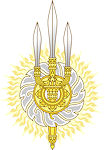
Der Kronprinz heiratet in dritter Ehe Srirasmi Akharaphongpreecha (ศรีรัศมิ์ อัครพงศ์ปรีชา, 1971 - ).
Abb.: Der Kronprinz mit Srirasmi (ศรีรัศมิ์), 2007
[Bildquelle: amrufm. -- http://www.flickr.com/photos/amrufm/1311196230/. -- Zugriff am 2012-04-02. -- Creative Commons Lizenz (Namensnennung)]
"Princess Srirasmi of Thailand (Thai: พระเจ้าวรวงศ์เธอ พระองค์เจ้าศรีรัศมิ์ พระวรชายาในสมเด็จพระบรมโอรสาธิราชฯ สยามมกุฎราชกุมาร; RTGS: —Si Rat—; Literal: "HRH Princess Srirasmi, the Princess Consort to the Crown Prince of Siam"),[3] or Srirasmi, Princess of Thailand, (born Srirasmi Akharaphongpreecha, 9 December 1971; Thai: ศรีรัศมิ์ อัครพงศ์ปรีชา) is the consort of Crown Prince Maha Vajiralongkorn. Born to a family of modest means, she entered the service of the Crown Prince at the age of 22. She married the crown prince in February 2001. Early life
HRH Princess Srirasmi was born in Samut Songkhram Province (สมุทรสงคราม ) to a family of modest means. She was the third child of Aphirut (Thai: อภิรุจ) and Wanthanee (Thai: วันทนีย์) Akharaphongpreecha (อัครพงศ์ปรีชา)). She has a total of four siblings.[4] She attended college at Bangkok Business College (โรงเรียนกรุงเทพการบัญชีวิทยาลัย). In 1993, at the age of 22, Srirasmi entered the service of Vajiralongkorn as a civil service "lady-in-waiting" (นางสนองพระโอษฐ์). Srirasmi enrolled in Sukhothai Thammathirat Open University (มหาวิทยาลัยสุโขทัยธรรมาธิราช) in 1997 and graduated in 2002 with a bachelor’s degree in management science. Vajiralongkorn personally bestowed her with her diploma. In 2007 she received a Master of Arts degree in Home Economics from Kasetsart University (มหาวิทยาลัยเกษตรศาสตร์).
Marriage and familyHRH Princess Srirasmi married the Crown Prince of Thailand on 10 February 2001 in a private ceremony at the prince's Nonthaburi Palace. The public was informed of the event some time afterwards. The prince, who had married twice before and has children with his previous wives, stated it was his intention to settle down: “I am now 50 years old and think I should have a complete family.”[5] After the wedding, Srirasmi was styled Mom Srirasmi Mahidol na Ayudhya (Mahidol is the surname of King Bhumibol Adulyadej and King Ananda Mahidol, and the na Ayudhya designation signifies non-titled descendants of the Chakri Dynasty.
On Valentines Day, 14 February 2005, it was announced that Srirasmi was pregnant. On 29 April 2005, a son named Dipangkorn Rasmijoti (ทีปังกรรัศมีโชติ) was born via caesarean section at Siriraj Hospital. Because of the birth, she was granted by King Bhumibol Adulyadej the title "princess of Thailand" and style "Her Royal Highness" as the royal consort of Crown Prince Maha Vajiralongkorn. A royal ceremony, called "Phra Ratchaphithi Somphot Duan Lae Khuen Phra U," to celebrate the first month of the baby was held on 17 June 2005 at the Anantasamakom Throne Hall (พระที่นั่งอนันตสมาคม) in Bangkok.[6]
Srirasmi initiated and launched the "Sai Yai Rak Jak Mae Su Luk" (Love and care from mother to children) campaign which promoted breast feeding.[7][8] The campaign features images of her son.
ControversyOn 12 November 2009, a home video was released to Wikileaks showing Vajiralongkorn and a topless Princess Srirasmi celebrating the birthday of the Prince's poodle dog.[9] Part of this video was broadcast on the 'Foreign Correspondent' programme on the Australian ABC TV channel on 13 April 2010, as part of a half-hour documentary critical of the Royal family of Thailand.[10]"
[Quelle: http://en.wikipedia.org/wiki/Srirasmi. -- Zugriff am 2012-04-02]
2001-02-14
Premiere des Films One Take Only (ส้ม แบงค์ มือใหม่หัดขาย) von Oxide Pang (彭順, 1965 - ).
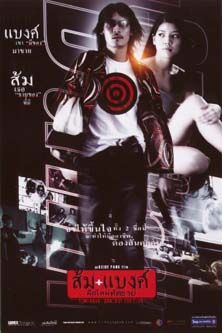
Abb.: Plakat
[Bildquelle: Wikipedia. -- Fair use]
|
"One Take Only (Thai: ส้ม แบงค์ มือใหม่หัดขาย, also Som and Bank: Bangkok for Sale) is a 2001 crime-drama film written and directed by Oxide Pang (彭順, 1965 - ). PlotBank (แบงค์) (Pawarith Monkolpisit) is a small-time hoodlum in Bangkok. He uses drugs, and sometimes works for some local gangsters, smuggling guns and drugs. One day he meets Som (ส้ม), a teenage girl who works as a prostitute. The pair fall in love, and in a bid to better their lives, they get into a drug deal that is too big for either of them. Production and releaseOriginally named Som and Bank: Bangkok for Sale, the film is part of the loose "Bangkok trilogy" by the Pang Brothers (彭氏兄弟, 1965 - ), which includes their Bangkok Dangerous (บางกอกแดนเจอรัส เพชฌฆาตเงียบ อันตราย, 1999) and Danny Pang's (彭發, 1965 - ) 1+1=0 (1+1 เป็นสูญ - Nothing to Lose). Som and Bank had been completed in 2001 before production commenced on their ghost film, The Eye (見鬼). The film had screened in November 2001 at the Bangkok Film Festival, but the studio, Film Bangkok, then shelved the film until February 2003, releasing it after Oxide Pang had re-edited it. The Board of Censors objected to the title of the film, so it was renamed One Take Only.[1] The film was also screened at the International Film Festival Rotterdam, the Hong Kong International Film Festival (香港國際電影節), the San Francisco International Film Festival, the Asiatica Film Mediale and the NatFilm Festival in 2002. The film was released on DVD by Tartan Films on August 22, 2006. Confusingly, it has also been released on DVD in Thailand as Som and Bank: Bangkok for Sale." [Quelle: http://en.wikipedia.org/wiki/Som_and_Bank:_Bangkok_for_Sale. -- Zugriff am 2013-03-19] |
2001-02-24
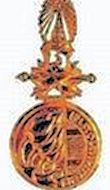
Zu National Artists (ศิลปินแห่งชาติ) werden ernannt:
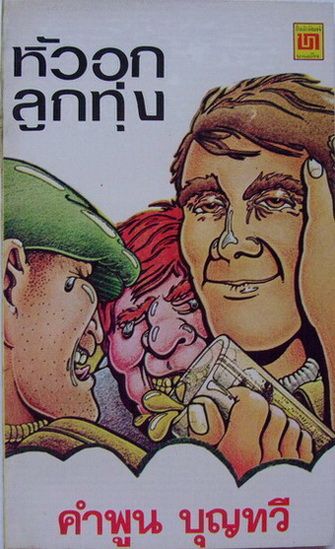
Abb.: Einbandtitel eines Buchs von Kumpoon Boontawee (นายคำพูน บุญทวี
= คร้าม ควนเปลว = พงศ์พริ้ง)
[Fair use]
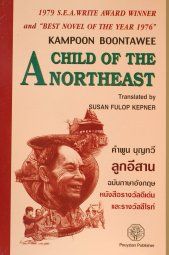
Abb.: Einbandtitel der englischen Übersetzung eines
Buchs von Kumpoon Boontawee (นายคำพูน บุญทวี
= คร้าม ควนเปลว = พงศ์พริ้ง)
[Fair use]
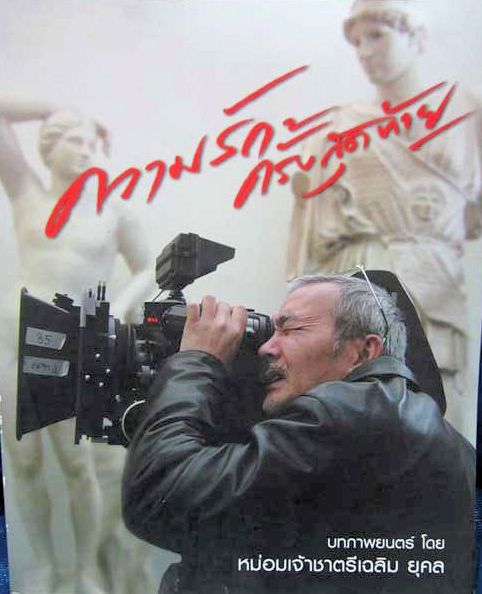
Abb.: Einbandtitel eines Buchs von Chatrichalerm Yukol (หม่อมเจ้าชาตรีเฉลิม
ยุคล)
[Fair use]
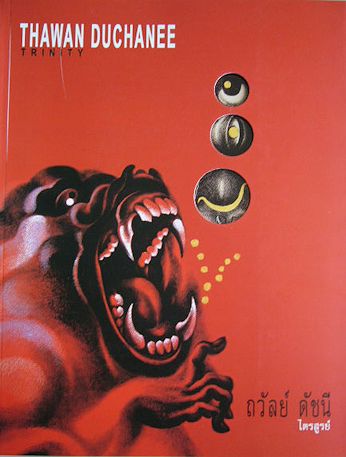
Abb.: Einbandtitel eines Buchs von Thawan Duchanee
(นายถวัลย์ ดัชนี)
[Fair
use]
2001-02-24
Das Musical "Chang & Eng (The Musical)" von Ekachai Uekrongtham (เอกชัย เอื้อครองธรรม) läuft in Bangkok an. Das Musical hatte 1997 in Singapur Premiere.
"Chang & Eng is a Singaporean musical theatre production directed by Ekachai Uekrongtham based on the lives of the Siamese twins, Chang and Eng Bunker. The music and lyrics were by Ken Low, with the book by Ming Wong, costumes by Niphon Tuntiyothin, set design by Thoranisorn Pitikul, lighting by Thio Lay Hoon, orchestral arrangement by Iskandar Ismail and choral direction by Babes Condes. The musical was first performed in 1997, rerun in subsequent years until 2002 and has since travelled around Asia. Performers such as RJ Rosales, Robin Goh and Edmund Toh have been cast as Chang and Eng, and writer-composer Ken Low has a cameo as the King of Siam in some productions. Chang and Eng also became the first English Language Musical to be ever performed in the People's Republic of China between 9th - 11 December 1997 at the Century Theatre, Beijing.
The musical focuses on the lives of Chang and Eng, from their troubled childhood, seen as outcasts by children in Siam but reassured by their mother Nok, to their journey to New York as exhibits managed by Captain Abel Coffin and their settling down with Adelaide and Sallie Yates in North Carolina."
[Quelle: http://en.wikipedia.org/wiki/Chang_&_Eng. -- Zugriff am 2011-12-27]
2001-03

Nach Schätzungen der 3. Thai Armee betreiben die UWSA (United Wa State Army (佤邦联合军 / ဝပြည် သွေးစည်းညီညွတ်ရေး တပ်မတော်) und ihre Affillierten in Myanmar 87 Drogenlaboratorien, davon dienen 23 der Produktion von Methamphetamin, die restlichen der Verarbeitung zu Pillen. Die Pillenfirman haben je mindestens zwei Maschinen, die 7 Pillen pro Sekunde produzieren.
Es sind 15 Hauptrouten bekannt, auf denen Methamphetamin aus Myanmar nach Thailand geschmuggelt wird.
2001-03-06

China stockt seinen Militäretat offiziell um 17,7% auf.
2001-03-09
Premiere des Films Mae bia (แม่เบี้ย) von Somching Srisuparp (สมจริง ศรีสุภาพ)
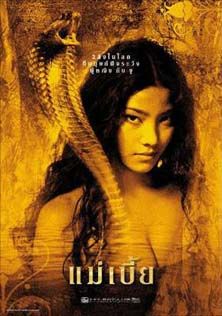
Abb.: Plakat
[Bildquelel: Wikipedia. -- Fair use]
|
"Mae bia (Thai: แม่เบี้ย, or The Snake Lady) is a 2001 Thai romance-horror film directed by Somching Srisuparp and starring Napakpapha Nakprasitte (นภคปภา นาคประสิทธิ์, 1981 - ) and Akara Amarttayakul (อครา อมาตยกุล, 1974 - ). PlotChanachol (ชนะชล), recently returned to Thailand after living overseas, signs up for a tour to get back in touch with Thai culture, and finds himself attracted to the tour guide, Mekhala (เมขลา). There are several problems with the relationship: Chanachol is married, with family, and Mekhala has a mysterious, symbiotic relationship with a deadly cobra, and many of her previous suitors have ended up dead. Cast
[Quelle: http://en.wikipedia.org/wiki/Mae_bia. -- Zugriff am 2013-03-19] |
2001-03-15

Bangkok Post: Reaktionen auf die Zerstörung der buddhistischen Statuen in Bamian (بامیان) durch die afghanische Taliban (د افغانستان د طالبان اسلامی تحریکِ ), da es vom Islam verbotene Götzenbilder seien.:
- Chaiwat Satha-Anand (ชัยวัฒน์ สถาอานันท์,1955 - ): zeigt gewisses Verständnis, da der Islam gegen Bilderkult ist
- Imtiaz Muqbil: verurteilt ohne Vorbehalt den barbarischen Akt.
Abb.: Lage von Bamian (بامیان)
[Bildquelle: OpenStreetMap. -- Creative Commons Lizenz (Namensnennung, share alike)]
Abb.: Die buddhistischen Höhlen von Bamian (بامیان) nach der Zerstörung der Statuen, 2010
[Bildquelle: Afghanistan Matters. -- http://www.flickr.com/photos/afgmatters/4477455046/. -- Zugriff am 2014-08-25. -- Creative Commons Lizenz (Namensnennung)]
2001-03-21

Abb.: Sanitsuda Ekachai (สนิทสุดา เอกชัย)
[Bildquelle: FAO]Bangkok Post: Sanitsuda Ekachai (สนิทสุดา เอกชัย, 1955 - ): "The booze is part of general decline."
Kommentar dazu, dass ca. 10% aller Mönche und Novizen drogenabhängig sind. "What monks want to protect isn't the faith. It's the temple donations which they consider their own. In short, greed made them lie."
Abb.: Drogengesetze in Thailand sind streng, Chiang Mai, 2006
[Bildquelle: hc.saustrup. -- http://www.flickr.com/photos/neurox/305721013/. -- Zugriff am 2012-09-28. -- Creative Commons Lizenz (Namensnennung, keine kommerzielel Nutzung, keine Bearbeitung)]
2001-03-27 - 2006-06-08
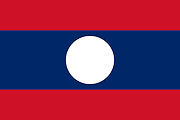
Bounnhang Vorachith (ບຸນຍັງ ວໍລະຈິດ, 1937 - ) ist Ministerpräsident von Laos
2001-04

Die Naresuan Task Force der Royal Thai Army konfisziert in der Amphoe Phop Phra (พบพระ) 13,7 Mio Pillen Ya Ba [ยาบ้า] und 5 kg Heroin nach zwei Gefechten mit der DKBA (Democratic Karen Buddhist Army / တိုးတက်သော ဗုဒ္ဓဘာသာ ကရင်အမျိုးသား တပ်ဖွဲ့).
Abb.: Lage von Amphoe Phop Phra (พบพระ)
[Bildquelle: OpenStreetMap. -- Creative Commons Lizenz (Namensnennung, share alike)]
2001-04-01
Einführung des 30-Baht Healthcare Scheme (โครงการประกันสุขภาพถ้วนหน้า aka 30 บาทรักษาทุกโรค).
Abb.: ®Logo
"Thaksin's 30-baht/visit universal healthcare program won the applause of the general public, but was criticized by many doctors and officials. Prior to the program's introduction, a large portion of the population had no health insurance and only limited access to healthcare. The program helped increase access to healthcare from 76% of the population to 96%. The program also increased workloads for health care employees, and caused many doctors to change to higher paying careers. It has also been criticized for being underfunded by the government. The program caused some hospitals to seek alternative sources of income, leading to a boom in medical tourism, with 1.3 million foreign patients earning Thailand 33 billion THB (approx. 800 million USD) in 2005. Post-coup public health minister Mongkol Na Songkhla (มงคล ณ สงขลา, 1941 - ) called the 30-baht program a "marketing gimmick" and claimed that the government would "very soon" stop charging patients any fees for visits to state hospitals. Many people who received the treatment claimed that they prefer drugs from pharmacists than from facilities covered by the scheme and almost half of the patients were dissatisfied with the service given by the facilities. The universal health care scheme raised a debt of 7.7 billion baht.
[...]
Thaksin allowed the estimated 2.3 million migrant workers in Thailand to register and seek health coverage under the Thai national healthcare system. They were also eligible for work permits at the end of the registration period, entitling them to full labor protection. "
[Quelle: http://en.wikipedia.org/wiki/Thaksin_Shinawatra#Healthcare_policies. -- Zugriff am 2011-12-27]
2001-04-05


Buriram (บุรีรัมย์): Tod von Acharn Suwat Suvaco (1919 - 2001), Gründer von vier Klöstern in den USA.
"Acharn Suwat Suvaco (August 27, 1919 - April 5, 2001 in Buriram - บุรีรัมย์) was a Buddhist monk who founded four monasteries in the western United States. He was ordained at the age of 20 and became a student of Acharn Fan Ajaro (อาจารย์ฝั้น อาจาโร, 1899 - 1977) two or three years later. He also studied briefly with Acharn Mun ( พระอาจารย์มั่น ภูริทัตโต, 1870 - 1949). Following Acharn Fan's death in 1977, Acharn Suwat stayed on at the monastery to supervise his teacher's royal funeral and the construction of a monument and museum in Acharn Fan's honor. In the 1980s Acharn Suwat came to the United States, where he established his four monasteries: one near Seattle, Washington; two near Los Angeles; and one in the hills of San Diego County (Metta Forest Monastery). He returned to Thailand in 1996."
[Quelle: http://en.wikipedia.org/wiki/Ajaan_Suwat_Suvaco. -- Zugriff am 2012-10-08]
Abb.: Lage von Buriram (บุรีรัมย์)
[Bildquelle: OpenStreetMap. -- Creative Commons Lizenz (Namensnennung, share alike)]
Abb.: Lage von Seattle, Los Angeles und San Diego
[Bildquelle: USGS. -- Public domain]
2001-04-05
Premiere des Films Killer Tattoo (มือปืน/โลก/พระ/จัน) von Yuthlert Sippapak (ยุทธเลิศ สิปปภาค, 1966 - ).
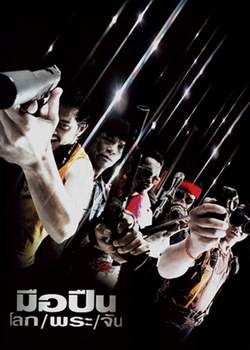
Abb.: Plakat
[Bildquelle: th.Wikipedia. -- Fair use]
|
"Killer Tattoo (Thai: มือปืน/โลก/พระ/จัน Mue Puen/Lok/Phra/Chan) is a 2001 Thai action-comedy film written and directed by Yuthlert Sippapak (ยุทธเลิศ สิปปภาค, 1966 - ). It was the debut film by Yuthlert, and also was the feature-film debut for popular Thai comedians Petchtai Wongkamlao (เพ็ชรทาย วงษ์คำเหลา, 1965 - ) and Pongsak Pongsuwan (พงศ์ศักดิ์ พงษ์สุวรรณ, 1966 - ) (playing an assassin who thinks he's Elvis Presley, 1935 - 1977). PlotThe scene is set sometime in the near future, after some type of apocalypse or war, and Thailand has been taken over by the United States. Just released from prison, aging assassin Bae Buffgun (เป๋ ปืนควาย) is offered a job – killing Bangkok's police chief. Buffgun forms a team of killers, comprising his old partner, Ghost Rifle and two newcomers, Dog Badbomb, a short-tempered explosives expert and Elvis M-16, who's suffered some of trauma that makes him think he's Elvis Presley. Meanwhile, Thailand's most deadly assassin, Kit Silencer has also been hired to kill the top cop. Confusion ensues, and even though the chief is killed, the crime lord who hired the killers wants them all dead anyway. All the hitmen have issues:
[Quelle: http://en.wikipedia.org/wiki/Killer_Tattoo. -- Zugriff am 2013-03-19] |
2001-04-18
Vier Drogendealer werden hingerichtet. Das ist der Beginn von Ministerpräsident Thaksins rigoroser Anti-Drogenpolitik.
2001-04-19

Seine Majestät, der König erhält vom Department of Intellectual Property das thailändische Patent für den "Water-Air Pump Type Aerator" (เครื่องกลเติมอากาศแบบอัดอากาศและดูดน้ำ).
Abb.: "Water-Air Pump Type Aerator" (เครื่องกลเติมอากาศแบบอัดอากาศและดูดน้ำ)
[Bildquelle: http://www.chaipat.or.th/chaipat/content/rx5/rx5.html. -- Zugriff am 2011-12-03. -- Fair use]
Abb.: "Water-Air Pump Type Aerator" (เครื่องกลเติมอากาศแบบอัดอากาศและดูดน้ำ)
[Bildquelle: http://www.chaipat.or.th/chaipat/content/rx5/rx5.html. -- Zugriff am 2011-12-03. -- Fair use]
2001-04-20

Laut Department of Religious Affairs konsumieren 10 Prozent (= 3000) der 30.000 buddhistischen Mönche Ya Ba [ยาบ้า].
2001-04-22
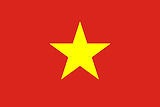
Die Kommunistische Partei Vietnams wählt Nông Đức Mạnh (1940 - ) zum Generalsekretär.
Abb.: Nông Đức Mạnh, 2007
[Bildquelle: Roosewelt Pinheiro / Agência Brasil / Wikipedia. -- Creative Commons Lizenz (Namensnennung)]
2001-04-26

Jun’ichirō Koizumi (小泉 純一郎, 1942 - ) wird Ministerpräsident Japans.
Abb.: Jun’ichirō Koizumi (小泉 純一郎) / von Murray Webb (1947 - ), 2005
[Bildquelle: Junichiro Koizumi. 10 August 2005. Webb, Murray, 1947- :[Digital caricatures published from 29 July 2005 onwards (2006, 2007, 2008). Includes a selection of digital caricatures published from 2002 and up to July 2005.]. Ref: DCDL-0000049. Alexander Turnbull Library, Wellington, New Zealand. http://natlib.govt.nz/records/22617351. -- Zugriff am 2013-03-09. -- "You can copy this item for personal use, share it, and post it on a blog or website. It cannot be used commercially without permission"]
2001-05
Banharn Silpa-archa (บรรหาร ศิลปอาชา, 1932 - ) über seien Rolle als Aufseher darüber, dass der Straßenbau und Straßenerhalt richtig durchgeführt wird:
"I am the acting control manager for the Department of Highways ... I am very strict. I go and see everything on every road, whether they are leveling ground, pouring concrete, or laying wooden bases. If my car doesn't shake as it moves on the road, I let [the construction work] pass. If my car shakes, I will have the contractor repair [the bad spot]." "Go and look at the road from Nakhon Sawan [นครสวรรค์] to Tak [ตาก]. It's very bad. It has completely crumbled. They have to build it all over again at a cost of 1.000 million Baht. It is a waste of money."
[Übersetzt in: Nishizaki, Yoshinori [訳吉武好孝, 西崎一郎]: Political authority and provincial identity in Thailand : the making of Banharn-buri. -- Ithaca, N.Y. : Cornell, 2011. -- 254 S. :Ill. ; 26 cm. -- (Studies on Southeast Asia ; 53). -- ISBN 978-0-8772-7753-8. -- S. 120f., 133]
Abb.: Lage von Nakhon Sawan [นครสวรรค์] und Tak [ตาก]
[Bildquelle: CIA. -- Public domain]
2001-05-01
Der Umweltaktivist Narin Podaeng (นรินทร์ โพธิ์แดง) wird ermordet
"a leader of the movement against a stone grinding plant belonging to a national politician in Rayong province [ระยอง]" [Quelle: https://www.facebook.com/notes/sulak-sivaraksa/on-11-october-2011-the-supreme-court-sentenced-mrs-jintana-kaewkao/10150370357358353/. -- Zugriff am 2016-01-08]
Abb.: Lage von Rayong province [ระยอง]
[Bildquelle: CIA. -- Public domain]
2001-05-01

Es erscheint:
Thais feel new urgency to stem flow of narcotics. -- In: Financial Times <London>. -- 2001-05-01
"In a simple blue building in the town of Bang Kla [บางคล้า], teen age girls from affluent Bangkok families are taken in to kick their methamphetamine habit. They are daughters of businessmen, bankers, parliament members and senior military officials, all casualties of what Thais call yaa baa [ยาบ้า] (mad medicine) and the western world calls speed.
Abb.: Lage von Bang Kla [บางคล้า]
[Bildquelle: OpenStreetMap. -- Creative Commons Lizenz (Namensnennung, share alike)]Sister Rosaline Ngamwong [งามวงศ์], the diminutive nun who runs the Women's Rebirth Centre [มูลนิธิศูนย์เกิดใหม่หญิง], is still shocked at the girls coming in hooked on a drug once mostly popular among working-class Thais, such as lorry-drivers and late night shift workers. "These are girls from good families, high society, good quality people - they have everything," she says.
[...]
Thaksin Shinawatra, the prime minister, has also made it clear that he intends to get tough. In a macabre spectacle on April 18, the government executed five convicted drug dealers, including two foreigners, allowing unprecedented broadcasts of their last hours - though not the moment of execution - on national television.
The executions, and the intrusion of over 100 journalists during the condemned men's final hours, prompted an outcry among human rights activists. But Mr Thaksin defended the tactics, saying the grim images would deter many from entering the drug trade.
"If they enjoy the profit from killing the young generation, they better be ready to endure the consequences," Mr Thaksin said yesterday at a ceremony to burn 2,266kg of speed, heroin and other narcotics seized by law enforcement officials last year."
[a.a.O. -- Fair use]
2001-05-02
Hunderte von Studierenden und Lehrpersonal der Thammasat University (มหาวิทยาลัยธรรมศาสตร์) protestieren dagegen, dass die Undergraduates der Liberal Arts Faculty auf den neuen Campus in Rangsit (ศูนย์รังสิต) verlegt werden sollen. Einige derer, die schon verlegt wurden, beklagen sich, dass die Studierenden in Rangsit (รังสิต) lieber in Shopping Malls bummeln oder die Sportanlagen benutzen als sich über Politik unterhalten.
Abb.: Lage des Rangsit (ศูนย์รังสิต) Campus der Thammasat University (มหาวิทยาลัยธรรมศาสตร์)
[Bildquelle: OpenStreetMap. -- Creative Commons Lizenz (Namensnennung, share alike)]
Abb.: Plan des Rangsit-Campus (ศูนย์รังสิต)
[Bildquelle: http://www.idatabase.in.th/2010/10/27/thammasat-direct-exam. -- Zugriff am 2001-12-27. -- Creative Commons Lizenz (Namensnennung, keine kommerzielle Nutzung, share alike)]
"2.8 km² Rangsit Centre (Thai: ศูนย์รังสิต) is the second campus and the largest campus of Thammasat University. It is located in Amphoe Khlong Luang (คลองหลวง), Pathum Thani Province (ปทุมธานี), 42 km north of Bangkok, and is easily accessible to Tha Phrachan (ท่าพระจันทร์) by shuttle buses operating on direct high-speed expressway. Realising the impact of science and technology on the country's economic growth, Thammasat University instituted degree programmes in engineering, technologies, physical sciences, and medicine at its Rangsit Centre in the 1980s and 1990s. Although established only for the science and technology-related faculties, all Bachelor's degrees have been taught here since 2006. All faculties (except the College of Innovation, the College of Interdisciplinary Studies and the Pridi Banomyong International College) are at the Center. The campus also houses the Sirindhorn International Institute of Technology (สถาบันเทคโนโลยีนานาชาติสิรินธร), an international academic institute attached to Thammasat which emphasises engineering and technological research and education. International programmes in Engineering, Health Science, and Journalism held by faculties are also taught at Rangsit Centre. The Thailand Science Park (อุทยานวิทยาศาสตร์ประเทศไทย, National Research Centre) and the Asian Institute of Technology are also located here. The campus divided into three areas: the academic zone, the housing zone (dormitories), and various sport facilities. The Thammasat University Sport Centre, located on the Rangsit campus, was used in the 1998 Asian Games and in the 2007 Summer Universiade. The campus is easily accessible by public buses and shuttle buses going to the Victory Monument (อนุสาวรีย์ชัยสมรภูมิ), Mo Chit BTS station (สถานีหมอชิต) and Tha Prachan (ท่าพระจันทร์) campus. Post office, police station, banks, canteens, stores are all in the campus."
[Quelle: http://en.wikipedia.org/wiki/Thammasat_University#Rangsit. -- Zugriff am 2011-12-27]
2001-05-02
Die Polizei nimmt in Bangkok eine Frau fest, die auf dem Rücksitz ihres Autos Collagen-Spritzen zu Schönheitszwecken verabreicht. Die Frau hat keinerlei medizinische Ausbildung.
2001-05-03

Abb.: Sanitsuda Ekachai (สนิทสุดา เอกชัย)
[Bildquelle: FAO]Bangkok Post: Sanitsuda Ekachai (สนิทสุดา เอกชัย, 1955 - ): "The rules are there to be tested"
Kommentar. Fernseh-Interviews der buddhistischen Novizin Dhammananda (ธัมมนันทา = Chatsumarn Kabilsingh - ฉัตรสุมาลย์ กบิลสิงห์, 1944 - ) dürfen auf dem Armee-eigenen Fernsehkanal 5 nicht gezeigt werden. Kanal 11 und UBC 8 haben sie aber zu Interviews eingeladen. Sanitsuda findet, dass das harmlos ist gegenüber einem Ereignis 1927: die Töchter Sara und Chongdee des Sozialkritikers Narin Klueng wurden als Novizinnen aufgenommen, deswegen aber sofort verhaftet, aus dem Orden ausgeschlossen, und für kurze Zeit inhaftiert. Daraufhin erklärte der Mönchsorden Frauenordination als illegal.
2001-05-12
Auf den Filmfestspielen in Cannes (Frankreich) wird erstmals ein Thai-Film gezeigt: Fah Talai Jone (ฟ้าทะลายโจร, Tears of the Black Tiger) von Wisit Sasanatieng (วิศิษฏ์ ศาสนเที่ยง, 1963 - ).
Abb.: Plakat
[Bildquelle: Wikipedia. -- Fair use]
"Tears of the Black Tiger (Thai: ฟ้าทะลายโจร, or Fa Thalai Chon, literally, "the heavens strike the thief") is a 2000 Thai western film written and directed by Wisit Sasanatieng (วิศิษฏ์ ศาสนเที่ยง). The story of a tragic romance between Dum, a fatalistic, working-class hero, who has become an outlaw, and Rumpoey, the upper-class daughter of a provincial governor, it is equal parts homage to and parody of Thai action films and romantic melodramas of the 1950s and 1960s. The film was the first from Thailand to be selected for competition at the 2001 Cannes Film Festival, where it was critically hailed.[3][4] It was screened at several other film festivals in 2001 and 2002, including the Vancouver International Film Festival, where it won the Dragons and Tigers Award for Best New Director. It also won many awards in Thailand for production and costume design, special effects and soundtrack.
Critics have noted the film's stylized use of color and conspicuous violence, and have compared it to the revisionist westerns of Sergio Leone and Sam Peckinpah. It has also been compared to the works of such directors as Douglas Sirk, John Woo, Jean-Luc Godard, Sam Raimi and Quentin Tarantino.
Miramax Films purchased the film for distribution in the United States, but changed the ending and then shelved it indefinitely. In 2006, the distribution rights were obtained by Magnolia Pictures, which screened the original version of the film in a limited release from January to April 2007 in several US cities.
PlotA young woman waits in the rain under an ornate gazebo in a lotus pond. She carries with her a photo of the man she is waiting for.
The man, whose name is Dum, is with another gunman named Mahesuan. Dressed all in black and wearing a cowboy hat, Dum enters a house and fires his pistol. The bullet ricochets around before it burrows into a man's forehead. A red title card then flashes up and says: "Did you catch that? If not, we'll play it again!" And the shot is replayed in slow motion, showing the bullet bouncing off items in a Rube Goldberg fashion.
Dum then rushes off, galloping his horse across the plain. However, by the time he reaches the gazebo, the woman, whose name is Rumpoey, is gone. She has returned home, where she is to be engaged to Police Captain Kumjorn in a marriage arranged by her father, the provincial governor.
Mahesuan is bitter about his status as a sidekick to Dum. He was the best gunman in the outlaw gang headed by the brutal Fai, until Dum came along. Eager to settle the score, Mahesuan goes looking for Dum and finds him playing a harmonica. Mahesuan knocks it out of Dum's hand and baits him into a gunfight. The quick-drawing Dum fires first, but Mahesuan is not injured. However, a dead snake drops from an overhanging tree branch onto Mahesuan's cowboy hat. Dum killed the venomous snake, saving Mahesuan's life.
Dum then thinks back to his childhood 10 years ago during the Second World War, when Rumpoey and her father left the city to stay on Dum's father's small farm in rural Thailand.
Rumpoey is a demanding girl. She smashes a bamboo flute that Dum is playing and demands that he take her on a boat ride in the lotus pond. They visit the gazebo, or sala in Thai language, and it is called "Sala Awaiting the Maiden." Dum says a woodcutter built it to await a wealthy family's daughter whom he had fallen in love with. However, the maiden was prevented from meeting the woodcutter, so she hanged herself. Rumpoey is touched by the story.
On the way home, they collide with a boat carrying three boys, who taunt Rumpoey. Dum defends Rumpoey, is struck with an oar and then their boat overturns. He rescues Rumpoey but is late in coming home. So he is punished by his father, who lashes the boy's back with a rattan cane. Rumpoey, feeling sorry for getting Dum into trouble, buys him a harmonica to replace the flute she broke.
Shifting back to present time, Dum and Mahesuan ride to an old Buddhist temple, where they swear a blood oath in front of the Buddha statue.
Meanwhile, Captain Kumjorn is eager to bring law and order to the wild west of Suphanburi Province (สุพรรณบุรี). In an attack on Fai's hide-out, the police forces seem to be gaining the upper hand. But then Dum and Mahesuan arrive on a cliff overlooking the battle and use rocket-propelled grenade launchers to decimate the police. Kumjorn is captured, and Dum is ordered by Fai to execute him. Kumjorn pleads with Dum to tell his fiancée of his fate, and he pulls out a framed photo of his beloved. Dum is stunned to see a photo of Rumpoey. Mahesuan enters to find Kumjorn gone and Dum with a knife in his chest.
As Dum's wound is being treated, he thinks back to one year ago, when he was a university student in Bangkok, where he became re-acquainted with Rumpoey. Dum pleads with her to leave him alone, reasoning that they are from different social classes and are fated to never be together. Later, Rumpoey is attacked by a gang of male students, the same boys from her childhood boat accident. Dum comes to her rescue but ends up expelled. Rumpoey finds Dum walking, and offers to give him a ride in her car. She then instructs her driver to take them to a nearby beach. Dum and Rumpoey confide their love for each other, and they agree to meet a year later at Sala Awaiting the Maiden.
However, Dum arrives at home and finds his father murdered. He takes his father's rifle, tracks the killers and shoots some of them. With one bullet left, he turns the gun on himself, but is stopped by Fai, who has ridden up with his horsemen. Fai recognizes the rifle, saying he had given it to Dum's father years before. Fai then hands Dum a pistol and tells him to finish the job of killing the men who murdered his father. Dum is now an outlaw.
Shifting back to the present, where it is the night before Rumpoey's wedding to Kumjorn, she tries to hang herself, but is stopped by her maid. Fai, meanwhile, plans to attack the governor's mansion, and Mahesuan, suspecting that Dum intentionally let Kumjorn go free, betrays Dum. A gun battle ensues, but Dum escapes.
Dum, dressed in a white suit, appears at the wedding and warns Kumjorn of Fai's plans to attack. Kumjorn, however, wants to shoot the man he knows as the "Black Tiger" and is his rival for Rumpoey's affection. Fai's men attack and Mahesuan breaks into the mansion, where he discovers Rumpoey, and knocks her unconscious. Mahesuan is carrying Rumpoey away when he meets Dum and demands a rematch gunfight. As a raindrop drips through a hole in the brim of Mahesuan's hat, Dum fires and the bullet rips through Mahesuan's teeth.
Dum, next confronted by Kumjorn, reaches into his pocket. Kumjorn, believing that he is reaching for his gun, shoots Dum. But Dum was only reaching for the photograph of Rumpoey that Kumjorn had once carried. As Dum lies dying in the rain with Rumpoey sobbing over him, some of Dum's words from earlier are narrated again – that life is suffering, punctuated only by a never-ending search for happy moments.
CastProduction Origins
- Chartchai Ngamsan (ชาติชาย งามสรรพ) as Dum (ดำ) Dua, or Seua Dum (Black Tiger)
- Suwinit Panjamawat (สุวินิจ ปัญจมะวัต) as Dum Dua (youth)
- Stella Malucchi (สเตลล่า มาลูกี้) as Rumpoey (รำเพย) Prasit
- Supakorn Kitsuwon (ศุภกรณ์ กิจสุวรรณ) as Mahesuan (มเหศวร)
- Arawat Ruangvuth (เอราวัต เรืองวุฒิ) as Police Captain Kumjorn (ร้อยตำรวจเอกกำจร)
- Sombat Metanee (สมบัติ เมทะนี) as Fai (ฝ้าย)
- Pairoj Jaisingha (ไพโรจน์ ใจสิงห์) as Phya Prasit (พระยาประสิทธิ์) (Rumpoey's father)
- Naiyana Sheewanun (นัยนา ชีวานันท์) as Rumpoey's maid (แม่นม)
- Kanchit Kwanpracha (ครรชิต ขวัญประชา) as Kamnan Dua (กำนันเดื่อ) (Dum's father)
- Chamloen Sridang as Sergeant Yam
While Tears of the Black Tiger has been compared to the revisionist westerns of Sam Peckinpah and Sergio Leone, director Wisit Sasanatieng drew on many Thai cultural influences in the creation of the film, including Thai films of the 1950s made by pioneering director Rattana Pestonji (รัตน์ เปสตันยี), whose films Wisit had viewed in screenings at the Thailand National Film Archive.
"Whenever the Film Archive screened an old film, I'd be there. Usually, I'd be the only one there," Wisit said in an interview at the Vancouver International Film Festival in 2000. "Most Thai audiences dislike Thai movies, especially the old ones, which they consider nam nao, (น้ำเน่า)" he said, using the Thai language euphemism for the old films, which are viewed as stagnant and cliched. Literally, nam nao means "stinky water."
"What I saw in them was a way to stay true to the spirit of those old styles of Thai filmmaking, as well as a way to make them new again. And none of the older generation of filmmakers impressed me more than Rattana Pestonji."
In addition to Rattana's 1950s and 1960s drama films, Tears of the Black Tiger draws on 1960s and 1970s Thai action cinema, derisively termed by critics as raboed phoo khao phao krathom ("bomb the mountain, burn the huts") films. Among the stars from this era were Mitr Chaibancha (มิตร ชัยบัญชา) and Sombat Metanee (สมบัติ เมทะนี) , who co-stars as gang leader Fai. Wisit has acknowledged the influence of Leone's Spaghetti Westerns but has said, "mine is 'Tom Yum Goong (ต้มยำกุ้ง) cowboys' because at one time cowboys were very popular in Thai films as you can see in Mitr Chaibancha's films."
Still more influences include the novels of Thai humorist Por Intharapalit (ป. อินทรปาลิต) and an old Thai pop ballad, "Fon Sang Fah" (ฝนสั่งฟ้า) ("When the Rain Bids the Sky Farewell"). "I do love those 'rain' songs. I kept picturing a beautiful frame of two guys shooting each other in the rain. And that sparked it all," Wisit said in an interview for the film's production notes. Initially Fon Sang Fah was to be the title of the film, but eventually Fah talai jone (ฟ้าทะลายโจร, literally "the heavens strike the thief") was chosen because the name has different meanings depending on the context. In addition to being the Thai name for an herb, Andrographis paniculata, Fah talai jone "can convey either a sense of obsoleteness or the feel of great chic," the director said. "In terms of the film it refers to predestination, in which most Thais believe. To put it frankly, the main reason is simply because I liked the name."
Production design, lighting, processingTears of the Black Tiger was the directorial debut for Wisit, who had previously penned the screenplays for the 1950s-set teenage gangster tale Dang Bireley's and Young Gangsters (2499 อันธพาลครองเมือง) and the historical Thai ghost legend, Nang Nak (นางนาก), both directed by Nonzee Nimibutr (นนทรีย์ นิมิบุตร), who produced Tears of the Black Tiger. Production design was by Ek Iemchuen (เอก เอี่ยมชื่น), a classmate of Wisit's from Silpakorn University (มหาวิทยาลัยศิลปากร)) who also worked on Nang Nak and Dang Bireley's as well as the 2001 period drama, Jan Dara (จัน ดารา), also by Nonzee.
The production designs reflects traditional aspects of Thai culture. For example, the first gun battle between Mahesuan and Dum is set on what is obviously a sound stage with a painted backdrop, a setting that is similar to likay (ลิเก)), a Thai form of folk opera.
"I wanted the audience to feel like they're reading a novel with moving illustrations," Wisit said. "It's pure imagination and completely unrealistic. I wanted to try and go back to our roots. I wanted to make a link between the traditional and the contemporary in our own style."
Over-saturated colors were used to reflect scenes of rural Thailand, which the director saw as bright and colorful. Walls on the sets and locations were painted pink or green, and lighting was used to achieve the saturation. The film was treated in the color grading process by transferring it to digital Betacam tape and then back to 35 mm film. Oxide Pang (彭順), working as a telecine colorist, won a special effects award in Thailand for his work.
Wisit was able to experiment with the set design and lighting effects in a commercial he directed for Wrangler Jeans, which featured the film's leading man, Chartchai Ngamsan, as a boxer.
Casting and promotionMost of the cast were relative newcomers, whom the director said he chose because he felt established stars would not be able to handle the old-style dialog. Chartchai Ngamsan and Supakorn Kitsuwon had previously had supporting roles in Dang Bireley's and Young Gangsters. Italian-born, Thailand-raised model and actress Stella Malucchi was acting in a music video in Bangkok, which was noticed on television by Wisit. He then sought out Malucchi, saying he thought she had the right look for the part of Rumpoey. He told her later she reminded him of Elizabeth Taylor. Through costuming and makeup, Malucchi, a "plain farang (ฝรั่ง)", in the words of Wisit, was transformed into the daughter of a Thai noble family. There are experienced actors in the cast as well, including Sombat Metanee and Naiyana Sheewanun, who worked in the era of Thai filmmaking that Wisit was trying to recreate.
Old-style ways of promoting the film were used. In the 1950s, films in Thailand were promoted with serial novels and radio dramas. Wisit and his wife Siripan Techajindawong (ศิริพรรณ เตชจินดาวงศ์) , writing under the pen name Koynuch (คอยนุช), wrote some chapters that were published for a Fah talai jone book after the film was released. A radio version of Fah talai jone was performed while the film was in cinemas in Thailand. Wisit designed movie posters and print ads that emulated the style of Thai film posters from the 1950s and 1960s.
ReceptionTears of the Black Tiger opened on September 28, 2000, in a wide release for Thai cinemas. The film was a flop at the domestic box office, but it received several awards. At the Thailand National Film Association Awards (รางวัลภาพยนตร์แห่งชาติ สุพรรณหงส์), the film won best costume design for Chaiwichit Somboon. The Bangkok Critics Assembly awarded Ek Iamchuen for best artistic design, Sombat Metanee for best supporting actor and Amornbhong Methakunavudh for best film score. The Entertainment News Reporters Association of Thailand gave Phra Suraswadee, or "Golden Doll", prizes to lyricist Siriphan Techajindawong and arranger Sunthorn Yodseethong for the song "Kamsuanjan" ("The Moon Lament"), Ek Iemchuen for best art direction and telecine colorist Oxide Pang for best special effects. Tears of the Black Tiger was referenced in another Thai film, Monrak Transistor (มนต์รักทรานซิสเตอร์), in 2001. The comedy by director Pen-ek Ratanaruang (เป็นเอก รัตนเรือง) starred Supakorn Kitsuwon, who co-starred in Tears as Mahesuan. At the 2006 Bangkok International Film Festival, Tears of the Black Tiger was screened as part of a tribute to Sombat Metanee, who portrays the outlaw leader, Fai.
The film's North American premiere was on October 5, 2000 at the Vancouver International Film Festival, where it won the Dragons and Tigers Award for best new director. It was the first Thai film to be screened at the Cannes Film Festival, where it was in the "Un Certain Regard" competition in May 2001. At the Gijón International Film Festival in 2001, it won the best art direction award, and at the fifth Puchon (부천) International Fantastic Film Festival it won a jury prize. Other festival appearances included the Seattle International Film Festival and Edinburgh International Film Festival in 2001 and the Sundance Film Festival, International Film Festival Rotterdam, Deauville Asian Film Festival and Moscow International Film Festival in 2002.
Critical receptionOn Rotten Tomatoes, the film has a 76% fresh rating, based on 58 reviews, with an 88% "Cream of the Crop" rating.[25] On Metacritic, it has a score of 69/100, based on 19 reviews, for a "generally favorable" rating.[26] Critics were "wowed" by the film at the 2001 Cannes Film Festival, according to Peter Bradshaw of The Guardian, who termed the film a "stir-fry horse opera [and an] uproarious high-camp cowboy drama."
Philip French of The Observer found parallels to Once Upon a Time in the West, particularly between the anti-hero Dum and Charles Bronson's harmonica-playing character. He also saw similarities to the deliberately artificial action of Sam Raimi's The Quick and the Dead. He said the "outlandishly painted backdrops and garish acid colors" reminded him of old Asian movie posters. "The overall effect is hallucinatory, as if we're experiencing someone else's druggy dream."
Chuck Stephens, writing for Film Comment, said the blend of 1970s Thai action cinema and the Spaghetti Westerns of Sergio Leone results in a "hybrid of hybrids ... a Pad Thai western where cowboys covet machine guns and swear blood oath to one another under the shadow of an impassive Buddha."
The BBC's Jason Korsner criticized the film for its "deliberately labored plot," which he said was "offset by some fascinating action sequences, including gunfights which would make Tarantino jealous."
However, Sight & Sound magazine's Edward Buscombe called the action "tame by contemporary Hollywood standards" but said it was "curiously seductive" because of its colorful imagery. Buscombe, as well as Philip French, remarked how Tears of the Black Tiger contrasted with another Asian cinema export to the West that year: the balletic martial arts film, Crouching Tiger, Hidden Dragon.
David Edelstein of New York Magazine compared the film to 1940s low-budget westerns of Lash La Rue, Douglas Sirk melodramas, the heroic bloodshed films of John Woo and George A. Romero's gore-filled horror films. "It's no buried postmodern masterpiece, but it certainly is a jaw-dropper: a delirium-inducing crash course in international trash," Edelstein wrote.[
A. O. Scott of The New York Times commented on the stoic, macho posturing of Chartchai Ngamsan's Dum, and the underlying homoeroticism of the character's relationship with Mahesuan, portrayed by Supakorn Kitsuwon. "[Rumpoey] may be the love of Dum's life, but there is far more heat and intimacy in his relationship with Mahesuan."
Elizabeth Weitzman of the New York Daily News noted the film's appeal as a camp film and as a cult film, saying "the best B-movies are both."
DistributionPurchase by Miramax, alternate versions
International sales rights to Tears of the Black Tiger were purchased by Fortissimo Films, which marketed a 101-minute "international cut", edited by director Wisit Sasanatieng from the original 110-minute length. The shorter version omits some transitional scenes in order to streamline the pacing of the film. This version was released theatrically in several countries, including France, the Netherlands and the United Kingdom.
Among the deleted scenes are those involving the comic relief character, Sergeant Yam, Rumpoey's engagement to Captain Kumjorn and other transitional scenes.
Fortissimo sold the US distribution rights to Miramax Films during the 2001 Cannes Film Festival. Miramax then sent word that it wanted to alter the film. Wisit offered the company an even shorter version than the international cut, but the company refused. "They didn't allow me to re-cut it at all," Wisit said in an interview with the Los Angeles Times. "They did it by themselves and then sent me the tape. And they changed the ending from tragic to happy. They said that in the time after 9/11, nobody would like to see something sad."
Altering films was routine for Miramax, at the time headed by Harvey and Bob Weinstein, who defended their actions by saying the films needed editing to make them marketable to American audiences. Other examples were the Miramax releases of Shaolin Soccer (少林足球) and Hero (英雄). "I'm not cutting for fun," Harvey Weinstein said in an interview. "I'm cutting for the shit to work. All my life I served one master: the film. I love movies."
The Miramax version was screened at the Sundance Film Festival in 2002. The company then shelved the film, fearing it would not do well in a wider release.
This was another routine by the Weinsteins, who delayed releases so they could shift potential money-losing films to future fiscal years and ensure they would receive annual bonuses from Miramax's corporate parent, The Walt Disney Company.
As Tears of the Black Tiger languished in the Miramax vaults, its cult film status was heightened and it became a "Holy Grail" for film fans. For viewers in the US, the only way to watch it was to purchase the DVD from overseas importers, however some of those versions of the film had also been heavily edited.
In late 2006, Magnolia Pictures acquired the film's distribution rights from Miramax. Magnolia screened the original version of the film in a limited release from January to April 2007 in several US cities.
DVD releasesThe original version of the film, with English subtitles, was released on DVD in Thailand by Digital Right, and it is out of print. A Singaporean Region 3 release, also with English subtitles, had scenes involving graphic violence cut. The Region 2 release, marketed in Europe by Pathé and in Region 4 by Madman Entertainment is the 101-minute "international cut".
The first DVD release for Region 1 was on April 24, 2007 by Magnolia Pictures, which acquired the original, uncut version of the film."
[Quelle: http://en.wikipedia.org/wiki/Tears_of_the_Black_Tiger. -- Zugriff am 2011-12-27]
2001-05-15
The Nation über den Oktobristen (คนเดือนตุลา) und Staatssekretär im Innenministerium, Phumtham Wechayachai (ภูมิธรรม เวชยชัย, 1953 - ):
"Formerly an activist and a NGO [Non Govenrnmental Organization] worker, he managed to persuade the protesters to return home shortly before the Songkran festival [สงกรานต์, 2001-05-13] last month. He also arranged for Thaksin to join a "farewell party" with the villagers at their protest site, giving a boost to the prime ministers image. .. .Thaksin has also assigned Phumtham to deal with certain issues that are viewed as hot potatoes: a project to build two power plants in Prachuap Khiri Khan [ประจวบคีรีขันธ์], a planned wastewater treatment plant in Samut Prakan [สมุทรปราการ], and the Thai-Malaysia gas pipeline project in Songkhla [สงขลา]." [Zitiert in: Kanokrat Lertchoosakul [กนกรัตน์ เลิศชูสกุล]: The rise of the Octobrists in contemporary Thailand : power and conflict among former left-wing student activists in Thai politics. -- New Haven : Yale University Southeast asia Studies, 2016. -- 364 S. 23 cm. -- (Yale Southeast Asia studies ; monograph 65). -- ISBN 9780985042943. -- Zugl. The London School of Economics and Political Science, thesis 2012-09. -- S. 215. -- Fair use]
2001-05-17
Der Umweltaktivist Pitak Tonewuth (พิทักษ์ โตนวุธ) wird ermordet.
"a leader of Baan Lum Nam Chompoo [บ้านลุ่มน้ำชมพู] community who opposed a stone grinding plant belonging to a national politician that had encroached on a forest reserve area in Pitsanulok province [พิษณุโลก]" [Quelle: https://www.facebook.com/notes/sulak-sivaraksa/on-11-october-2011-the-supreme-court-sentenced-mrs-jintana-kaewkao/10150370357358353/. -- Zugriff am 2016-01-08]
Abb.: Lage der Provinz Phitsanulok
[Bildquelle: CIA. -- Public domain]
2001-05-17

Abb.: Sanitsuda Ekachai (สนิทสุดา เอกชัย)
[Bildquelle: FAO]Bangkok Post: Sanitsuda Ekachai (สนิทสุดา เอกชัย, 1955 - ): "What has become of goodwill"
Kommentar zur heftigen Reaktion der Mönchsfunktionäre auf die Novizinnen-Ordination (สามเณรี) von Chatsumarn Kabilsingh (รศ.ดร. ฉัตรสุมาลย์ กบิลสิงห์, 1944 - ; Ordensnamen: Dhammananda - ธัมมนันทา).
"The ferocious attacks by the clergy on Dhammananda Samaneri (สามเณรี) show there is no room for kindness when the holy men feel their status quo under threat. Phra Dhepdilok, vice-abbot of Wat Bowonniwet (วัดบวรนิเวศวิหาร), is a prominent monk who represents the powerful conservative camp in the clergy. He slammed Dhammananda Samaneri’s ordination as revenge on behalf of her mother, a female monk in the Mahayana tradition, against the Theravada clergy. Matichon newspaper (มติชน) quoted him as saying: "It’s not a matter of monks wanting to ordain women or not. Monks just do not have the right to do this. There’s no way out of this matter because the Vinaya determines so. "What Dhammananda, or Chatsumarn Kabilsingh, is doing is not a way out. She only wants to take revenge for her mother. In her days, the mother also caused a lot of trouble for religion.
"Had Chatsumarn any knowledge of dhamma practice and spiritual liberation, she would have known that ordination is unnecessary. Everyone is equal in practising dham- ma. Forms are not necessary. What matters is the mind: being ever in Sila (right conduct), Samadhi (concentration) and Panna (wisdom). That’s all that counts. Who needs to be ordained? Women’s ordination is impossible. Why pressure monks? All she wants is to create confusion in the country and to find ways to berate monks."
Phra Dhepdilok is not alone in his anger. Immediately after Dhammananda Samaneri’s ordination, many leading names in male-dominated Buddhist circles lined up to discredit her as a front for a "third party" to destroy Buddhism. It doesn’t take much knowledge of Buddhism to see that such angry responses violate the Buddhist teachings on right speech and compassion.
Shouldn’t we expect monks and those who claim to be well-versed in dhamma to know and act better? Where is the equanimity and understanding they keep preaching to women while keeping ordination out of women’s reach?
If form and ordination are unnecessary, why do men need to become monks?"
[Sanitsuda Ekachai (สนิทสุดา เอกชัย) <1955 - >: Keeping the faith : Thai Buddhism at the crossroads. -- Bangkok : Post Books, 2001. -- 322 S. : Ill. ; 23 cm. -- ISBN 974-228-016-9. -- S. 297]
2001-05-19

Die Bangkok Post berichtet über den verzwickten Kampf der Muslime um die Kontrolle über die Zertifikation von halal-Fleisch (حلال) (ฮาลาล, für Muslime erlaubt)
Abb.: Halal-Zertifikat (حلال) von The Central Islamic Commitee of Thailand
2001-05-29



NZZ: Buddhistische Mönche bekämpfen AIDS : Kambodschaner profitieren von thailändischen Erfahrungen
Abb.: Lage von Chiang Mai (เชียงใหม่) und Kambodscha
[Bildquelle: OpenStreetMap. -- Creative Commons Lizenz (Namensnennung, share alike)]
"Das vom Sextourismus geplagte Thailand setzt bei der Aids-Prävention und der Betreuung der Kranken auf die buddhistischen Klöster. Von den positiven Erfahrungen, die dabei gemacht wurden, will Kambodscha nun lernen. Dabei genießt die Einbeziehung der Geistlichkeit, wie sie in Thailand praktiziert wird, höchste Priorität. Dort leitet eine Vielzahl von Klöstern inzwischen Meditationszentren für HIV- Positive und Aids-Patienten. Die Mönche und Nonnen helfen den Betroffenen bei der Arbeitssuche und wirken sozialen Ängsten und Diskriminierung entgegen. Kurs für Mönche in Chiang Mai (เชียงใหม่)
Nach Ansicht des Mönchs Phra Phongthep Dhammagaruko reicht die Vermittlung religiöser Inhalte nicht aus, um der Diskriminierung HIV- positiver Menschen entgegenzuwirken. Der buddhistische Geistliche arbeitet seit sieben Jahren im Aids-Hospiz «Friends for Life Home», das außerhalb der im Norden Thailands gelegenen Stadt Chiang Mai angesiedelt ist. «Durch unser Engagement können wir viel mehr bewirken», versichert der Mönch. «Wenn wir Menschen davon abbringen wollen, andere zu diskriminieren, sollen wir mit gutem Beispiel vorangehen und uns mit Aids-Kranken befassen.» Die Notwendigkeit, auf die Betroffenen zuzugehen, vermittelt Phra Phongthep allen Mönchen, die zu dem spirituellen Heim kommen, um sich über die Möglichkeiten der Aids-Bekämpfung beraten zu lassen, so auch einer Gruppe kambodschanischer Mönche, die sich Ende April zu einem Seminar in Chiang Mai einfanden, um Anregungen zu erhalten, wie sie in ihrer Heimat HlV-Infizierten helfen können. Das Vorhaben genoss die Unterstützung der Regierung in Phnom Penh. Finanzielle Hilfe leistete das Weltkinderhilfswerk Unicef, während Sangha Metta, eine in Thailand angesiedelte Nichtregierungsorganisation, die Durchführung des Projektes organisierte.
Auf Grund der regional höchsten Ansteckungsrate droht die Immunschwächekrankheit in Kambodscha ein ähnlich epidemisches Ausmaß anzunehmen wie in Thailand, und die Gemeinden sind dringend auf den moralischen Beistand ihrer geistlichen Führer angewiesen. Der Einsatz von Mönchen und Nonnen gibt den Betroffenen und ihren Familien den Mut und die Kraft, ein würdiges Leben zu führen. Die Erfahrungen in Thailand und anderen Ländern in der Region hätten gezeigt, dass buddhistische Mönche viel für Menschen tun können, die das Hl-Virus in sich tragen, bestätigt der Kambodscha-Beauftragte von Unicef. Mönche hätten schon immer eine traditionelle Rolle gespielt, indem sie die Gemeinden betreut, die Bevölkerung unterwiesen und die Jugend unterrichtet hätten. Die Aids-Beratung und die Betreuung der Betroffenen seien lediglich eine Erweiterung dieser Tätigkeiten."
[Quelle: NZZ Internationale Ausgabe. -- 2001-05-29. -- S. 48. -- Fair use]
2001-05-29 - 2001-07-01

Kunsthaus Hamburg: Ausstellung Polypolis : Kunst aus Megastädten Asiens. Aus Thailand nimmt Kamol Phaosavasdi (กมล เผ่าสวัสดิ์, 1958 - ) teil
2001-06-01

Der nepalesische Thronfolger, Dipendra Bir Bikram Shah Dev (दीपेन्द्र वीर विक्रम शाह, 1971 - 2001), erschießt bei einem Familientreffen seine Eltern, König Birendra Bir Bikram Shah Dev (वीरेन्द्र वीर विक्रम शाह, geb. 1945) und Königin Aishwarya Rajyalaxmi Devi Shah (ऐश्वर्या राज्य्लक्ष्मी शाह, geb. 1949), sowie sieben weitere Familienmitglieder.
Abb.: Lage von Nepal
[Bildquelle: OpenStreetMap. -- Creative Commons Lizenz (Namensnennung, share alike)]
Abb.: Vom Thronfolger ermordet: König Birendra Bir Bikram Shah Dev (वीरेन्द्र वीर विक्रम शाह)
[Bildquelle: Duvilar / Wikipedia. -- GNU FDLicense]
2001-06-17
Laut Bangkok Post bewirkt die Öffnung der Schleusen des des Pak Mun Staudamms (เขื่อนปากมูล) für vier Monate, dass 40 bis 50 Arten von Fischen in den Fluss zurückkehren, die wegen des Staudamms nicht mehr im Fluss vorkamen. Die Regierung beschließt daraufhin, die Schleusen ein Jahr lang geöffnet zu lassen und die Untersuchung abzuwarten, ob die Flussökologie wiederhergestellt werden kann.
Abb.: Lage des Pak Mun Staudamms (เขื่อนปากมูล)
[Bildquelle: OpenStreetMap. -- Creative Commons Lizenz (Namensnennung, share alike)]
2001-06-17

Die Beziehungen von Laos zu Thailand verschlechtern sich wegen der negativen Darstellung des letzten Königs von Vientiane (ວຽງຈັນ), Anuvong (ເຈົ້າອານຸວົງ, 1767 - 1829), im Film Tao Suranari (ท้าวสุรนารี). Der laotische Geschäftsträger in Bangkok beklagt, dass durch diesen Film die laotisch-thailändischen Beziehungen auf einem Tiefpunkt angekommen sind.
Abb.: Lage von Vientiane (ວຽງຈັນ)
[Bildquelle: OpenStreetMap. -- Creative Commons Lizenz (Namensnennung, share alike)]
2001-06-22



China, Laos, Myanmar und Thailand schließen das Agreement on Commercial Navigation on the Lancang-Mekong River (瀾滄江 = ແມ່ນ້ຳຂອງ = မဲခောင္မ္ရစ္ = แม่น้ำโขง). U. a. beabsichtigt China, im Mekong-Oberlauf 51 Felsen und Untiefen wegzusprengen.
Abb.: Oberlauf des Mekong
[Bildquelle: CIA. -- Public domain]
"To promote transportation along the river, facilitate trade and tourism, and strengthen cooperation in commercial navigation. As such, no charges were to be levied upon vessels of signatory parties by reason only of their passage through the territory of other contracting parties except only as payment for specific services rendered to the vessel. 14 ports designated under the agreement:
/ เชียงรุ่ง), Menghan, and Guanlei
- China: Simao (思茅), Jinghong (景洪
Lao PDR: Ban Sia, Xiengkok, Muangmom, Ban Khouane, Houayxay (ຫ້ວຍຊາຍ), and Luang Prabang (ຫຼວງພະບາງ )Myanmar: Wang Seng, Wang Pong Thailand: Chiang Saen (เชียงแสน), Chiang Khong (เชียงของ)."
2001-06-25


Sik (Malaysia): Eröffnung eines thai-buddhistischen Tempels aus 15.000 Flaschen: grüne Heineken und Braune Chang Bierflaschen. Er gehört zum Wat Charok Padang (aka วัดเตราะปาดัง - Wat Trok Padang, 玻璃樽庙) in Pekan Batu Lima.
Abb.: Lage von Sik
[Bildquelle: OpenStreetMap. -- Creative Commons Lizenz (Namensnennung, share alike)]
2001-06-26
Der Umweltaktivist Suwat Wongpiyasathit (สุวัฒน์ วงศ์ปิยะสถิตย์) wird ermordet
"a leader of the Bangplee [บางพลี] community who opposed the Rajathewa [ราชาเทวะ] garbage dump in Samutprakarn province [สมุทรปราการ]" [Quelle: https://www.facebook.com/notes/sulak-sivaraksa/on-11-october-2011-the-supreme-court-sentenced-mrs-jintana-kaewkao/10150370357358353/. -- Zugriff am 2016-01-08]
Abb.: Lage von Bang Phli [บางพลี]
[Bildquelle: OpenStreetMap. -- Creative Commons Lizenz (Namensnennung, share alike)]
ausführlich: http://www.payer.de/thailandchronik/ressourcen.htm
Zu Chronik 2001 / B. E. 2544. -- 3. Juli bis Dezember